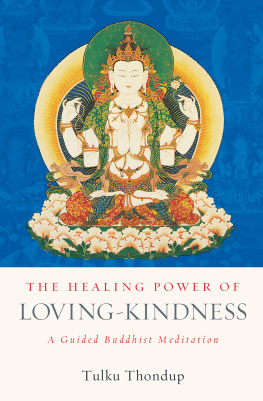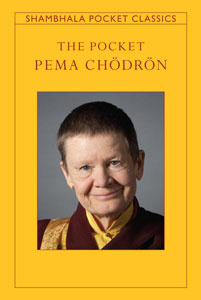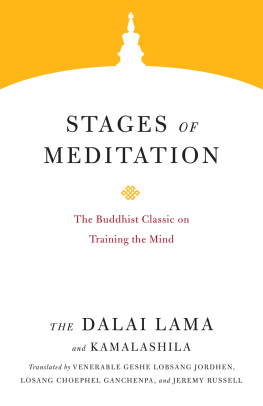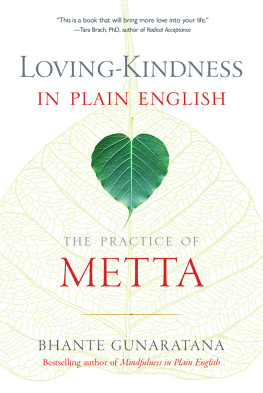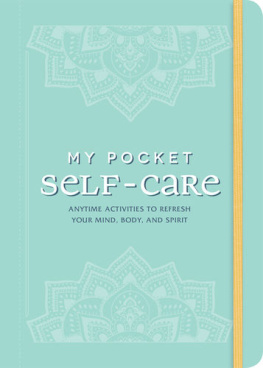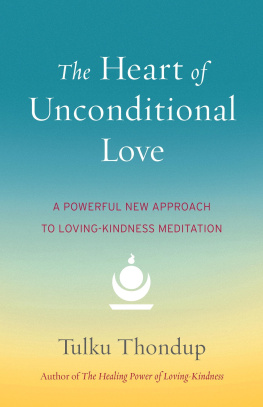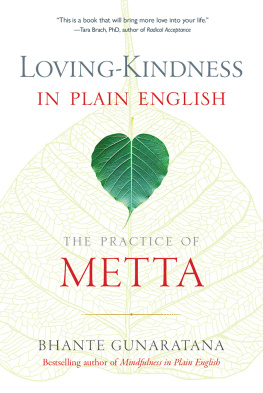Loving-KindnessMeditation
How to create more joy, hopeand love in your life
Fredrik Andersson
Copyright 2015 FredrikAndersson. All rights reserved. Including the right to reproducethis book or portions thereof, in any form. No part of this textmay be reproduced in any form without the express writtenpermission of the author.
Table of Contents
Introduction
Loving-KindnessMeditation , or Mettmeditation, is an ancient meditation form taught byBuddha
to develop themental habit of selfless or altruistic l ove.
Buddha said:
"Hatred cannotcoexist with loving-kindness, and dissipates if supplanted withthoughts based on loving-kindness."
There is now ancollaboration between the science community and Buddhist monks andthis research has proven the great benefits of practicing Loving-Kindness Meditation andhow it contributes to our well-being.
In this bookyou will learn about the many benefits Loving-Kindness Meditationhas on our well-being according to scientific studies and you willalso learn how to practice Loving-Kindness Meditation to be able toincrease your own well-being.
Benefits of Loving-Kindness Meditation
There has beena lot of research on Loving-Kindness Meditation, here is the mostup-to-date and current research on the subject.
Increase positiveemotions and gain resources
One of theworlds leading experts in positive emotions , in the science community, is Barbara Fredrickson,she did a research where she took 139 participants and divided theminto 2 groups, one Loving-Kindness Meditation group and onewaitlist group (a group waiting to do the Loving-KindnessMeditation). The Loving-Kindness Meditation group didLoving-Kindness Meditation during 7 weeks, 1 time/week they hadinstructor led Loving-Kindness Meditation and 5 times/week theylistened to guided Loving-Kindness Meditation from a CD.
The resultsshowed that the Loving-Kindness Meditation group had a significantly higherincrease in positive emotions compared to the waitlist group. Theyalso showed that this lead to an increase in a number of resources,e.g. more mindfulness, higher self-acceptance, more purpose inlife, more positive relations with others and less illnesssymptoms. This gain in resources also led to more satisfaction withlife.
BarbaraFredrickson did a follow-up study 15 months later and it was shownthat the participants still had more positive emotions andresources. It also showed that about 35% of the participants stillmeditated and they had even more positive emotions than those whodidnt still meditate.
From thes tudies:
Open HeartsBuild Lives: Positive Emotions, Induced Through Loving-KindnessMeditation, Build Consequential Personal Resources
In search ofdurable positive psychology interventions: Predictors andconsequences of long-term positive behavior change
Lessself-criticism
Ben Shahar andothers took 38 highly self-critical individuals and put them into 2groups, one Loving-Kindness Meditation group and one waitlistgroup. The Loving-Kindness Meditation group did a 7-weekLoving-Kindness Meditation program and the participants showed asignificant decrease in self-criticism and depressive syndromes, aswell as a significant increase in self-compassion and positiveemotions compared to the waitlist group. A follow-up analysisshowed that these gains were maintained 3 months after theLoving-Kindness Meditation program ended.
From thestudy:
Wait-ListRandomized Controlled Trial of Loving-Kindness Meditation Programmefor Self-Criticism
Immediate relaxingeffect
WMR Law recruited 113 participants anddivided them into two groups, one group did a 10-minuteLoving-Kindness Meditation and a control group did a 10-minutevisualization session and it showed that they who did theLoving-Kindness Meditation had an immediate relaxing effect asevidenced by increased respiratory sinus arrhythmia, an index ofthe parasympathetic system, which is the relaxation system in thehuman body. In addition, this brief Loving-Kindness Meditation ledto greater positivity towards the self and also protected againstsome negative effects of social stress.
From the study:
An AnalogueStudy of Loving-Kindness Meditation as a Buffer against SocialStress
Decreasesmigraines
MakenzieTonelli & Amy Wachholtzrecruited 27 participants who had 2-10 migraines per month. Allparticipants were meditation-nave and attended a 20-minute guidedLoving-Kindness Meditation session. After the session they reporteda 33% decrease in pain and a 43% decrease in emotional tension.This shows that a single exposure to a brief meditation practicecan significantly decrease pain and tension.
From the study:
Meditation-Based Treatment Yielding Immediate Relief forMeditation-Nave Migraineurs
Decreases chronicpain
James Carsonand others recruited 43 persons with chronic low back pain andrandomly assigned them into 2 groups, one group did Loving-Kindness Meditation and thecontrol group received standard care.
Follow-upanalysis showed significant improvement in pain and psychologicaldistress for the Loving-Kindness Meditation group but not in thestandard care group. It was also shown that more Loving-KindnessMeditation practice was related to lower pain the same day and lessanger the next day.
From the study:
Loving-Kindness Meditation for Chronic Low BackPain
Decreasesposttraumatic stress disorder (PTSD)
David Kearneyand others recruited 42 veterans with PTSD who took part in a 12week Loving-Kindness Meditation course as an addition to theirusual care. Self-compassion increased with a large effect size andmindfulness with medium to large effect sizes.
There wasevidence of meditation givingreductions in PTSD symptoms and depression by enhancedself-compassion. Overall, Loving-Kindness Meditation appeared safeand acceptable and was associated with reduced symptoms of PTSD anddepression.
From the study:
Loving-Kindness Meditation for Posttraumatic Stress Disorder:A Pilot Study
Longer telomerelength (connected toaging)
Telomere length is connected to the agingprocess, the longer telomeres, the less the cells age in our body.It is connected to a Nobel prize in medicine 2009. For instance,telomere length is about 8,000 base pairs in newborns, 3,000 basepairs in adults and as low as 1,500 in elderly people.
Elizabeth Hoge and others recruited 15experienced Loving-Kindness Meditation practitioners and comparedthem to 22 control participants. It showed that Loving-KindnessMeditation practitioners had longer telomere length, but notsignificantly longer. Although when comparing only the women, itshowed that the Loving-Kindness Meditation practitioners hadsignificantly longer telomere length than the women in the controlgroup.
These results offer the intriguingpossibility that Loving-Kindness Meditation practice, especially inwomen, might lengthen the telomere length, a biomarker associatedwith longevity.
From the study:
Loving-Kindness Meditation practiceassociated with longer telomeres in women
Increased Social Connectedness
Cendri Hutcherson and others recruited 93participants and were randomly selected into 2 groups, one groupdid a 7-minute Loving-Kindness Meditation and the control group dida 7-minute neutral imagery practice.
Compared with the control group, even just afew minutes of Loving-Kindness Meditation increased feelings ofsocial connection and positivity toward unknown individuals.
These results suggest that Loving-KindnessMeditation can help to increase positive social emotions anddecrease social isolation.
From the study:
Loving-Kindness Meditation Increases SocialConnectedness
Next page



